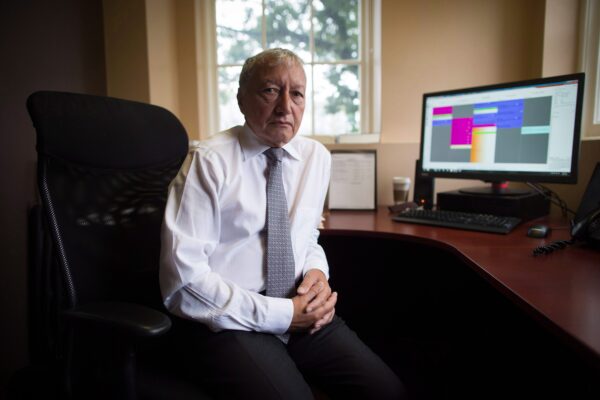Supreme Court’s Decision Will Hurt Patients in Canada
Commentary Recently, the Supreme Court of Canada announced it was not willing to hear an important health care court case. Patients should know, the court’s decision is anything but good news. Dr. Brian Day, founder of the Cambie Surgery Centre in British Columbia, was hoping to build on a 2005 Supreme Court ruling that found it was unlawful for the Quebec government to force patients to wait long periods for health care while also banning private options. The Supreme Court then famously noted: “access to a waiting list is not access to health care.” Following that decision, private health care options grew in Quebec. For various reasons, patients cannot pay for whatever procedure they want in “La Belle Province,” but Quebecers do have the option of going to a private clinic to pay for many common surgeries, such as knee and hip operations. (Quebec patients can of course continue to use the public system if they so choose–and most do.) Back in 2009, Dr. Day began a legal challenge against legislation in British Columbia that also restricted patients’ access to private health care. Considering the Supreme Court had ruled just a few years prior that private health care bans violated Quebec’s provincial Charter of Rights, and although decision was split on whether it also violated Canada’s Charter of Rights, many expected Dr. Day’s court challenge to be fairly straightforward since a precedent had been set and people in one Canadian province were assured certain rights. Fast forward 14 years and Day’s case finally made its way to the Supreme Court of Canada. But despite what should have been an easy decision, the court just announced that the case would not be heard. Dr. Brian Day, Medical Director of the Cambie Surgery Centre, sits for a photograph at his office in Vancouver on Aug. 31, 2016. (The Canadian Press/Darryl Dyck) Thus, Canada is now in a position where the Supreme Court has awarded Quebecers more health care rights than the rest of the nation. At the same time, the highest court in the land has signalled that it has no plans to change this disparity. Patients should know that health care systems that outperform Canada allow patients a choice: use the public system or pay out-of-pocket for private care. Australia, New Zealand, Sweden, Norway, Japan–they all give patients a choice. No other developed nation on earth bans private health care like Canada does. While Canada remains trapped in an ideological health care straightjacket, other nations understand that by giving patients a choice, some will decide to pay for private care. When that happens, there is less pressure on their public system. Simply put, each time a patient pays for a private MRI scan or hip operation, that’s one fewer case the public system has to worry about. It would be foolish to expect Ottawa to step up and pass legislation to give Canadians in the rest of the country the same rights as Quebec patients. Our federal government has, after all, taken a rather extreme position when it comes to health care. They expect all Canadians to wait together in misery while provincial governments continue to fumble around and slowly ration health services to the public. In fact, the federal government recently announced $74 million in fines for provincial governments that allow patients to pay for diagnostic scans at private clinics if they don’t want to wait for the public system. If provincial governments cave under Ottawa’s pressure and shut down private diagnostic clinics, then we’ll see even more patients flooding into the government’s system. In other words, longer wait times. In the meantime, patients will continue to suffer, face worsening health conditions, and even die. SecondStreet.org has gathered government data from across the country showing at least 41,620 patients have died while waiting for surgery and diagnostic scans since 2018-19. Many of these patients died while waiting for procedures which could have improved their quality of life (e.g. hip operations) in their final years, but the data also includes cases where patients died while waiting for potentially life-saving treatment. For instance, retired Ontario nurse Judy Anderson told SecondStreet.org about how her daughter Shannon died while waiting for a potentially life-saving heart procedure in 2021. After waiting as long as she could, Shannon eventually called her family over to her house, said her goodbyes, and checked-in to the hospital the next day. A few days later, she was gone, leaving behind four children. It’s unacceptable that Canada’s top court has essentially created rights for patients in one province, but has decided against extending those rights to the rest of the country. Perhaps if you’re a six-figure-salary Supreme Court judge with a golden pension, you don’t need to worry about health care–you have the means to skip long waiting lists by simply travelling to another country for faster treatment. But for the rest of us, we coul

Commentary
Recently, the Supreme Court of Canada announced it was not willing to hear an important health care court case. Patients should know, the court’s decision is anything but good news.
Dr. Brian Day, founder of the Cambie Surgery Centre in British Columbia, was hoping to build on a 2005 Supreme Court ruling that found it was unlawful for the Quebec government to force patients to wait long periods for health care while also banning private options.
The Supreme Court then famously noted: “access to a waiting list is not access to health care.”
Following that decision, private health care options grew in Quebec. For various reasons, patients cannot pay for whatever procedure they want in “La Belle Province,” but Quebecers do have the option of going to a private clinic to pay for many common surgeries, such as knee and hip operations. (Quebec patients can of course continue to use the public system if they so choose–and most do.)
Back in 2009, Dr. Day began a legal challenge against legislation in British Columbia that also restricted patients’ access to private health care. Considering the Supreme Court had ruled just a few years prior that private health care bans violated Quebec’s provincial Charter of Rights, and although decision was split on whether it also violated Canada’s Charter of Rights, many expected Dr. Day’s court challenge to be fairly straightforward since a precedent had been set and people in one Canadian province were assured certain rights.
Fast forward 14 years and Day’s case finally made its way to the Supreme Court of Canada. But despite what should have been an easy decision, the court just announced that the case would not be heard.

Thus, Canada is now in a position where the Supreme Court has awarded Quebecers more health care rights than the rest of the nation. At the same time, the highest court in the land has signalled that it has no plans to change this disparity.
Patients should know that health care systems that outperform Canada allow patients a choice: use the public system or pay out-of-pocket for private care. Australia, New Zealand, Sweden, Norway, Japan–they all give patients a choice. No other developed nation on earth bans private health care like Canada does.
While Canada remains trapped in an ideological health care straightjacket, other nations understand that by giving patients a choice, some will decide to pay for private care. When that happens, there is less pressure on their public system. Simply put, each time a patient pays for a private MRI scan or hip operation, that’s one fewer case the public system has to worry about.
It would be foolish to expect Ottawa to step up and pass legislation to give Canadians in the rest of the country the same rights as Quebec patients. Our federal government has, after all, taken a rather extreme position when it comes to health care. They expect all Canadians to wait together in misery while provincial governments continue to fumble around and slowly ration health services to the public.
In fact, the federal government recently announced $74 million in fines for provincial governments that allow patients to pay for diagnostic scans at private clinics if they don’t want to wait for the public system. If provincial governments cave under Ottawa’s pressure and shut down private diagnostic clinics, then we’ll see even more patients flooding into the government’s system. In other words, longer wait times.
In the meantime, patients will continue to suffer, face worsening health conditions, and even die.
SecondStreet.org has gathered government data from across the country showing at least 41,620 patients have died while waiting for surgery and diagnostic scans since 2018-19. Many of these patients died while waiting for procedures which could have improved their quality of life (e.g. hip operations) in their final years, but the data also includes cases where patients died while waiting for potentially life-saving treatment.
For instance, retired Ontario nurse Judy Anderson told SecondStreet.org about how her daughter Shannon died while waiting for a potentially life-saving heart procedure in 2021. After waiting as long as she could, Shannon eventually called her family over to her house, said her goodbyes, and checked-in to the hospital the next day. A few days later, she was gone, leaving behind four children.
It’s unacceptable that Canada’s top court has essentially created rights for patients in one province, but has decided against extending those rights to the rest of the country.
Perhaps if you’re a six-figure-salary Supreme Court judge with a golden pension, you don’t need to worry about health care–you have the means to skip long waiting lists by simply travelling to another country for faster treatment. But for the rest of us, we could certainly do with more choice. And isn’t the system supposed to be about patients?
Views expressed in this article are the opinions of the author and do not necessarily reflect the views of The Epoch Times.












